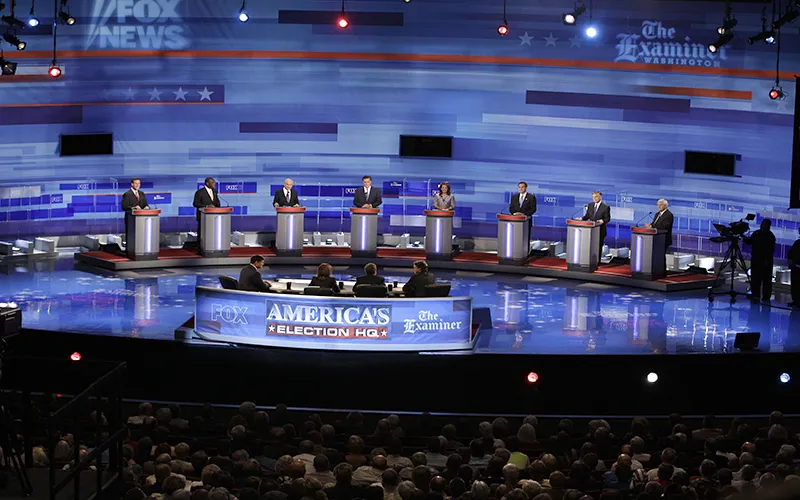-
CENTRES
Progammes & Centres
Location

"The excitement surrounding the first Republican debate on August 6 managed to live up to the buzz and hype, generating some powerful performances from a few GOP candidates. Ten leading Republican presidential frontrunner candidates participated in the first primary debate in Cleveland, Ohio. The debate was hosted by Fox News moderators in conjunction with Facebook. The line-up of participants included a vibrant mix of incumbent and former governors — Jeb Bush, Chris Christie, Mike Huckabee, Scott Walker and John Kasick; real-estate mogul Donald Trump; Senators Marco Rubio, Ted Cruz, Rand Paul and retired neuro-surgeon Ben Carson. These top ten participants were chosen on the basis of an average of leading five opinion polls. The primary idea of the candidates participating in the debate was to woo voters and acquaint them with their positions on issues.
What was evident from the two-hours of compelling debate was a renewed conviction that the 2016 Republican field, although crowded, is impressive and offers a difficult choice for voters to choose from— Governor Bush's impressive economic record, Marco Rubio's rigorous foreign policy adeptness, Rand Paul's self-casting as ""a different type of Republican"", Trump's brash, unapologetic and supreme confidence to 'Make America Great' among others. In spite of a good debate, the lack of specific solutions to problems, especially on foreign policy from front-runner candidates, particularly Jeb Bush and Trump was disappointing.
Before the debate commenced, there was speculation that the face-off would entail a critical spotlight on the exchanges between the Republican front-runner candidates Jeb Bush and Donald Trump. Contrary to popular expectations, Trump and Jeb Bush did not engage in a heated debate. Instead, Trump with his bombastic rhetoric and taste for hurling insults left his rivals struggling. Living up to his populist appeal, Trump at the outset of the debate catapulted himself to the limelight mentioning that he would not hesitate to contest independently for President if he fails to get the Republican Party's nomination. On the other hand, Jeb Bush maintained a low key position on issues and stated that even though the barrier for nomination is higher for him, he would run hard with his heart to earn the nomination. The candidates debated on sensitive issues such as abortion, gay-marriage rights and immigration, exposing the party's fault-lines and deep divides among the candidates. In spite of the differences, a majority of the candidates seemed to agree on the subject of revitalizing America's military standing in the world and called for deeper foreign policy engagement.
On the question of illegal immigration, Donald Trump proposed building a wall to prevent large-scale immigration from Mexico. On the other hand, Governor Kasich bounced the idea that each candidate has different approach to resolving the problem of illegal immigration. Senator Rubio instead explained that people coming across the border illegally are not only from Mexico, but the majority is from Guatemala, El Salvador and Honduras. Agreeing that the US needs a fence, Rubio added that there is also an urgent need for e-verify and have entry-exit tracking systems at the borders. In spite of agreement among the candidates that illegal immigration needed to be urgently prevented, there was an abject lack of specifics except from Senator Rubio. Similarly, the major thrust of the candidates' position on Middle East strategy was that the present administration under the leadership of President Obama abandoned Iraq, creating a vacuum for the ISIS to grow. Bush also mentioned that the Iran agreement needs to be stopped.
What was interesting to note was that no candidate was able to offer a strong alternative in place of the present policies outlined by the Obama administration aside from reposing faith in strengthening America's military presence across the globe. This again brought the burning ideological question to the fore of the debate—would American foreign policy be about restoring self-interest or would it carry with itself the ideological burden of advocating liberal values and spreading freedom?
Boosted by a hometown crowd, John Kasich offered a more uplifting vision than most of his rivals. He skillfully defended both his attendance at a gay wedding and his decision to expand Medicaid while offering a just explanation of Donald Trump's appeal. Marco Rubio piqued the interest of voters with his focused answer on curriculum reforms in education policy. On the other hand, for Trump, the debate served just another platform to inculcate the politics of doom and fear of America's decline. As analysts struggle to explain his rising popularity, Trump's persistent return to language which is highly divisive and mean-spirited without offering policy positions has become his hallmark. After the debate, Jeb Bush's popularity ratings have been abysmally poor. This could be due to his poor performance during which he appeared to be low-spirited, hesitant and weak. In place of Jeb Bush, Marco Rubio and Scott Walker have gained highly.
The first Republican debate has set the momentum and the pace for future debates. American voters more or less now have a broad overview of the positions undertaken by the candidates. Some of the candidates like Marco Rubio, John Kasich and Scott Walker were able maximize their gains from the debate platform as they shone through the debate, maintaining composure and responding to questions in a focused manner. Candidates like Mike Huckabee, Ted Cruz, Chris Christie, Ben Carson and Rand Paul were seen struggling to clarify their positions, often highlighting a lack of preparation in their ideas. The debate served as reminder for Jeb Bush that while dynastic politics may help with massive funds, it cannot compensate for a charismatic leadership. The highlight of the debate was Donald Trump. In spite of the incredibly minimalistic intellectual heft that Trump induced in the debate, he could not be cornered by his rivals.
Courtesy: US Election Monitor "
The views expressed above belong to the author(s). ORF research and analyses now available on Telegram! Click here to access our curated content — blogs, longforms and interviews.